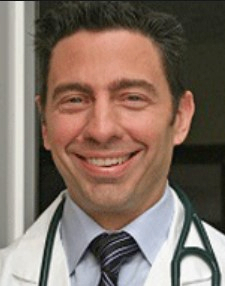While COVID-19 vaccines are being rolled out to the public less than a year after official reports of the novel coronavirus pandemic in the United States, there is still no vaccine for another deadly virus that reared its ugly head about 40 years ago, accounting for 700,000 American deaths and ravaging the health of at least a million more.
That virus is HIV, the human immunodeficiency virus that leads to the disease known as AIDS.
But there have been many medical advances over the last four decades that have worked to prolong and improve the lives of those who have been afflicted with HIV. Just in the past decade, a medication to prevent HIV infection also has proven to be effective.

Dr. Christopher Hall
Christopher Hall, M.D., an infectious diseases specialist and researcher at Sutter’s Alta Bates Summit Medical Center in Oakland, knows well the uncertainty and fear sparked by a virus outbreak, as well as the excitement spurred by new research to develop effective treatment and vaccines.
While the world begins immunizing the public against COVID-19, HIV research has dramatically flashed forward since the early AIDS epidemic of the 1980s. Dr. Hall, who began working in Washington, D.C. to combat the HIV virus in 1987, is currently leading a research initiative in the East Bay that he hopes will provide even more HIV prevention options.
“Without an HIV vaccine, the more prevention options we can prove to be effective and safe, and that can be made available and accessible to people who may benefit, the better,” Dr. Hall says. “Different options are needed for different patients and in different life circumstances.”
Currently available drugs for the treatment of HIV cannot cure the disease, but they can help people with the virus stay healthy by preventing the virus from reproducing. The HIV virus can advance through several different steps to make copies of itself as part of the virus’ lifecycle. If unimpeded, HIV integrates its genetic material into the body’s healthy CD4 cells, essentially turning the CD4 cell into a factory that makes more HIV virus particles, resulting in worsening HIV infection.
Dr. Hall says that one of the biggest achievements in HIV prevention came in 2012, when the U.S. Food and Drug Administration (FDA) approved a daily pill called Truvada® as a means to not just treat HIV but to prevent HIV virus infection from occurring in the first place—a strategy known as HIV pre-exposure prophylaxis (PrEP) for people who are HIV-negative.
Dr. Hall hopes that his latest research initiative will extend the proven strategy of HIV pre-exposure prophylaxis to include a new form of dosing. He led Sutter’s participation through its Alta Bates Summit Medical Center, in a clinical trial testing a new long-acting, injectable drug called cabotegravir. An injection could potentially take the place of an oral pill in providing consistent protection from sexually acquired HIV. Cabotegravir stops the HIV viral replication process at the crucial point where the virus attempts to integrate its DNA with the DNA of a healthy CD4 cell.
“The approval of new classes of HIV drugs—and new drugs in the classes already available—will help provide more prevention options for people seeking to avoid infection with HIV,” says Dr. Hall.
Conducting the study through Alta Bates Summit Medical Center’s East Bay Advanced Care, also known as East Bay AIDS Center, presented a unique opportunity to enroll participants from underserved communities in the East Bay of Northern California.
“At East Bay Advanced Care, we’ve been proud to offer hands-on support, medical treatments, complementary therapies and educational services for our diverse community’s residents who are living with HIV/AIDS,” says Dr. Hall. “Insights from studying this promising new strategy for HIV prevention may greatly expand our ability to deliver care services that are informed by science and guided by an ethos to support health equity.”





